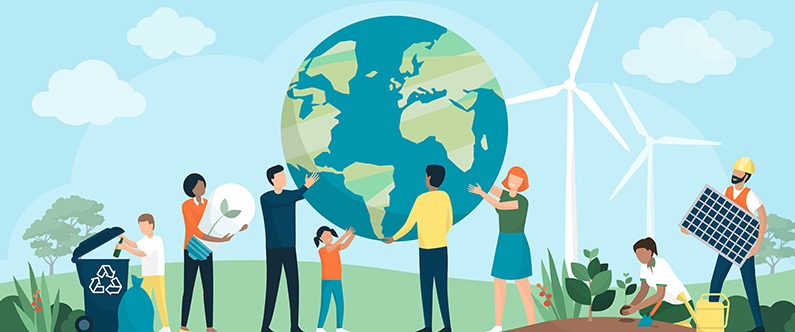Invest in your health and help preserve our planet
 Our individual choices can and do make a difference
Our individual choices can and do make a difference
Climate change has a substantial, albeit indirect, impact on human health and disease. Rising sea levels, extreme temperatures and weather events are a threat to human development, maintenance of livelihoods, and food and water security. Disruptions of the physical, biological, and ecological systems in our planet can increase respiratory and cardiovascular disease, injuries, and premature deaths, change the prevalence and geographical distribution of food- and water-borne illnesses and other infectious diseases, and pose a threat to mental health. The root cause of climate change is the burning of fossil fuels, such as coal, oil, and natural gas, which results in emissions of greenhouse gases (GHGs) such as carbon dioxide. Systemic changes in how we produce energy and food must be implemented by governments at national, regional, and global levels to form a fair and equitable global climate governance system.

Let’s help our planet and ourselves
What can we as individuals do to tackle the climate crisis—an issue with such a broad scope? It turns out that we can do a lot! Our individual choices can and do make a difference!
Follow these tips for a sustainable planet:
- Eat more vegetables. Producing food from animals utilizes more resources than plants. Reducing meat consumption can thus considerably lower GHG emissions. Furthermore, adopting a plant-based diet also has health benefits when it comes to diseases such as obesity, diabetes, and cancer. This doesn’t mean that you should never eat animal products. Reducing the number of days we consume meat in a week (e.g., from 5 to 4 days) will make a meaningful difference.
- Avoid food waste. When we throw away food, we also throw away all the resources that went into making it. Plan what foods items to buy ahead of time. Food waste can be composted and used for gardening instead of fertilizers.
- Use public transportation. Doha has an elegant and comprehensive metro system, and Karwa buses run on a regular schedule (which you can track on the Karwa app!). Public transportation systems have much lower GHG emissions compared to driving personal vehicles. If you must drive, do everything in one trip rather than several, and carpool when possible. In the winter months, when possible, walk and bike rather than drive.
- Reduce, Reuse, Repair and Recycle.
-
- Using functioning devices and appliances for longer reduces the demand for resources, and the GHG emissions that are baked in.
- Opt to repair broken products, rather than buying new items.
- Recycle whenever possible. Aluminum cans, glass, and paper are all highly recyclable, and recycling bins are popping up all over Doha. Some hypermarkets in Qatar have recycling initiatives, e.g., for electronic devices, and others offer additional loyalty points for those who recycle cans and plastics at collection points.
- Plastic is not a highly recyclable material, so aim to minimize the use of plastics, wherever possible.
- Save energy. Most households get energy powered by fossil fuels. Switch off lights, air conditioning, and appliances after use; opt for more energy efficient appliances; and air-dry washed clothes. Choose LED bulbs over incandescent ones, solar lighting for outdoors and solar drip-irrigation systems for gardens.
- Save water. Most of Qatar’s water is obtained through desalination of sea water, which is a very energy-intensive process.
- Fix minor leaks as soon as they begin.
- Turn off taps while brushing teeth, shaving, or doing the dishes.
- Run your washing machine only with a full load and using the cold-water option.
- Wash your car out of a bucket instead of a hose.
- Water plants at night when less is lost to evaporation.
- Buy local. Not only does that mean reduced GHG emissions from transportation and cooling to keep food fresh, but it also supports the local economy.
- Buy eco-friendly products. You decide what you spend your money on. Choose companies that monitor their impact on the planet and are working to cut back on waste.
All of us at an individual level can help take care of our planet. Become part of the solution! Let’s save our planet for future generations!